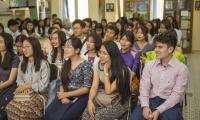A new generation of human rights defenders in Myanmar

In the classrooms at the East Yangon University, young men and women are sitting together in small groups, crouched over books, the covers of which have “International Human Rights Law” bolded with capital letters. These men and women are law students and the first generation in half a century who are studying human rights at a university in Myanmar.
Throughout the protracted military rule in Myanmar people could risk imprisonment for showing dissent against the military government agenda. Freedom of expression was subjected to some of the harshest restrictions in the world and education on human rights was prohibited.
“It is impossible to even talk about human rights education before 2015. Back then we had no human rights class and we had no research about human rights. Now we have it on the curriculum, and we can teach it to the students. This is really important, and I think that the human rights education has changed the students’ way of thinking and their attitudes,” says Dr. Yu Mon Cho, who teaches law at East Yangon University.
Working under challenging conditions
The path towards human rights has not been straightforward for Myanmar; while opportunities to strengthen human rights have presented themselves in some areas, human rights violations continue to be widespread in others. Discrimination and systematic human rights violations against ethnic minorities in Myanmar been well-documented, especially in relation to the Rohingya community in Rakhine state, and are a cause for serious concern for the Danish government and the Danish Institute for Human Rights.
“Working in challenging environments around the globe, we are continuously assessing the impact we have on promoting human rights through our partnerships. We recognise that human rights are being severely violated in Myanmar, but we remain committed to work alongside partners in order to contribute to a long-term process of facilitating human rights change in Myanmar,” says Eva Grambye, Head of the International Division at the Danish Institute for Human Rights.
Implementing human rights
The introduction of human rights education by the universities in Myanmar within their law departments has been achieved with collaborative support of the Danish Institute of Human Rights working under the Denmark – Myanmar Programme on Rule of Law and Human Rights. Following national elections in 2015 and the initial democratic government transition in Myanmar, Denmark committed to supporting Myanmar in strengthening the rule of law and fostering respect for human rights in the country. This was much needed as the country lacked adequate legal services and had a judiciary struggling to deliver justice to the people and protecting their human rights.
“Myanmar has been through a long period of isolation but have begun a transition towards democracy. It takes time to change the mindsets of people and build strong democratic institutions, but we’re committed to supporting Myanmar on this journey. Introducing human rights education in the universities is a key element in this development,” explains John Nielsen, the Danish ambassador to Myanmar.
Through the Programme, human rights education has been implemented at Dagon and East Yangon universities allowing the law students to study human rights for the first time. The success of the Programme at these two universities has been a key contributing factor to the 2019 decision by the Myanmar Board of Legal Studies to make human rights law a mandatory course for all law students in the country’s 21 law departments. Four thousand students have since been taught human rights law as a core course.
A new generation of lawyers
The law students at Dagon and East Yangon universities have taken a great interest in working with human rights.
“We want to know about the right to life and the right to education. But what is really important to the students and also to the political activists in Myanmar is freedom of expression and freedom of association. That is what we want to learn about,” affirms Kyaw Lwin, law student at East Yangon University.
With various ambitions for their professional future, some students dream of a career at a private law firm, others want to work in government and some intend to start their own businesses. Regardless, they share a collective opinion that human rights are vital for Myanmar and the country’s continued democratic progression:
“All the law students go on to be lawyers, judges, CEO’s or something like this. We go all over Myanmar and with us we bring the human rights knowledge.”
Phone Thit Min is studying at Dagon University and hopes to become a human rights lawyer in Myanmar or perhaps one day work for the International Criminal Court. He feels confident that the young people of Myanmar will keep working to protect human rights in the country.
“The next generation, like us, will be the generation which will respect human rights and will give human rights education to the next generation, to bring a lot of change to Myanmar. We are all human rights enthusiasts and maybe in the future, we will be the ones fighting for human rights.”
Benefiting the legal profession
Many of the young students will go on to work as legal professionals in the justice system in Myanmar. While it has not been possible to receive a human rights education until recently, some lawyers have been working for years to promote human rights in Myanmar; one of these people is Advocate Daw Khin Moe Moe. For decades, she has been providing legal aid to ethnic minorities, poor people and political prisoners. Today, she is the secretary of the Independent Lawyers Association of Myanmar and she believes that the implementation of human rights education in Myanmar is indeed necessary:
“Before 2015, most lawyers wouldn’t talk about human rights in public. It was too sensitive. But now it is changing,” states Daw Khin Moe Moe and continues:
“I realised that a lot of people don’t know about human rights, including many lawyers. They don’t know about human rights, women’s rights, children’s rights, freedom of speech and so on. That’s why we provide training, in collaboration with the Denmark-Myanmar Programme on Rule of Law and Human Rights.”
The Embassy of Denmark in Myanmar has contracted the International Commission of Jurists and the Danish Institute for Human Rights in a joint venture to provide technical assistance and capacity building to all partners within the Denmark – Myanmar Programme on Rule of Law and Human Rights.

